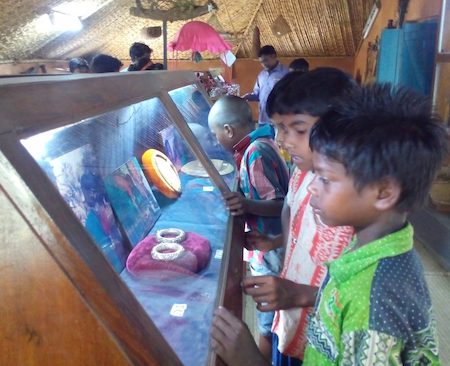[…] To appreciate the potential of the community museum, consider the challenges local communities, especially disadvantaged ones, face today. The effects of globalization include persistent poverty, loss of cultural identity, accelerated migration, and disintegration of the bonds of unity and solidarity within local communities. In this context, the community museum is not a luxury, and its value is not simply decorative: it is a necessity that allows communities to repossess their heritage, both physically and symbolically. It is a tool for rethinking the future, for facing rapid transformations with the strength born of a core identity rooted in the past. It is a concrete image of the values that bind a people together, and a vehicle to project and legitimize these values. It is an opportunity to remember the vital experiences that should not be forgotten, but should be preserved to educate the generations who will inherit them.
As a repository for the stories a community tells to recreate its way of life, the community museum is a process of self-interpretation. In the museum, community members participate collectively in selecting themes for exhibitions, in choosing and collecting objects, in researching and analyzing their history and culture, in representing their stories, and in creating drawings, murals, photographs, scale models, and life-size installations. In this process, all participants are dynamically engaged, strengthening and developing direct personal bonds to their collective identity. They also have the opportunity to share a learning experience, to step back and collectively analyze the elements of community unity and conflict through creative interpretation.
These museums are also centers for cultural organization and action that mobilize a community and provoke it to develop new initiatives. They generate programs to strengthen the cultural identity of children, train adults in a variety of skills, promote and support local artists and artisans, and develop community tourism. Community museums are a window on the world, offering multiple possibilities for cultural exchange as well as serving as a vehicle for networking with other communities. These networks between communities allow local initiatives to expand and become regional in scope, affecting cultural policies by making the voice of communities heard. […]
CUAUHTÉMOC CAMARENA AND TERESA MORALES
Source: Living homes for cultural expression in North American Native Perspectives on Creating Community Museums, pp. 77-86
Source: National Museum of the American Indian Smithsonian Institution Washington, D.C., and New York 2006.
URL: http://americanindian.si.edu/collaboration/files/LivingHomesforCulturalExpression.pdf
Date Visited: 12 July 2011
[Bold typeface added above for emphasis]

eBook | Free catalogue: Museum of Santal Culture >>
“The Museum of Santal Culture is located in Bishnubati, a Santal village situated 10 kilometers away from Tagore’s Visva-Bharati University in Santiniketan. The museum is managed by the Bishnubati Adibasi Marshal Sangha, the registered society founded by the villagers. The Santali name of the museum is ‘Santal Arichalidoho-jogao Bakhol’, which means ‘the house for taking care of Santal culture and heritage’. […] The museum helps the children to know the positive aspects of Santal life and to find their cultural identity in the modern world.” – Dr. Boro Baski in Articulate >>
List of ethnographic museums: State (Capital)
India’s ethnographic museums
Andhra Pradesh (Hyderabad) – Govt. of India | Please use the custom search field below for up-to-date information
Related posts about this state/region: www.indiantribalheritage.org >>
Assam (Dispur) – Govt. of India | Please use the custom search field below for up-to-date information
Related posts about this state/region: www.indiantribalheritage.org >>
Gujarat (Gandhinagar) – Govt. of India | Please use the custom search field below for up-to-date information
Related posts about this state/region: www.indiantribalheritage.org >>
Jharkhand (Ranchi) – Govt. of India | Please use the custom search field below for up-to-date information
Related posts about this state/region: www.indiantribalheritage.org >>
Kerala (Thiruvananthapuram) – Govt. of India | Kerala Institute for Research, Training & Development Studies of SC/ST (KIRTADS, Kozhikode) | Please use the custom search field below for up-to-date information Related posts about this state/region: www.indiantribalheritage.org >>
Madhya Pradesh (Bhopal) – Govt. of India | Please use the custom search field below for up-to-date information
Related posts about this state/region: www.indiantribalheritage.org
Maharashtra (Mumbai) – Govt. of India | Please use the custom search field below for up-to-date information
Related posts about this state/region: www.indiantribalheritage.org >>
Manipur (Imphal) – Govt. of India | Please use the custom search field below for up-to-date information
Related posts about this state/region: www.indiantribalheritage.org >>
Orissa / Odisha (Bhubaneshwar) – Govt. of India | Museum of Tribal Arts and Artifacts, SC/ST Research and Training Institute (Bhubaneshwar) | Please use the custom search field below for up-to-date information
Related posts about this state/region: www.indiantribalheritage.org >>
Rajasthan (Jaipur) – Govt. of India | Please use the custom search field below for up-to-date information
Related posts about this state/region: www.indiantribalheritage.org >>
Tamil Nadu (Chennai) – Govt. of India | Please use the custom search field below for up-to-date information
Related posts about this state/region: www.indiantribalheritage.org >>
Tripura (Agartala) – Govt. of India | Please use the custom search field below for up-to-date information
Related posts about this state/region: www.indiantribalheritage.org >>
Uttar Pradesh (Lucknow) – Govt. of India | Please use the custom search field below for up-to-date information
Related posts about this state/region: www.indiantribalheritage.org >>
West Bengal (Kolkata) – Govt. of India | Please use the custom search field below for up-to-date information
Related posts about this state/region: www.indiantribalheritage.org >>